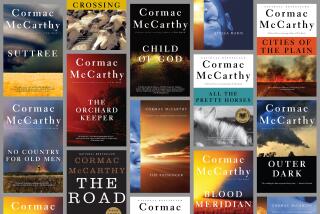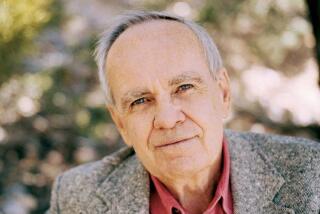MOVIE REVIEW : ‘Kansas’ More Suitable for Small Screen
- Share via
“Kansas” (citywide) is a nice little movie, well worth a look on a TV screen but one that doesn’t warrant the time, money or effort to see it in a theater.
Matt Dillon and Andrew McCarthy are engaging, but David Stevens’ overly conventional direction lacks the style to bring freshness and punch to Spencer Eastman’s complicated and drawn-out script. At 1 hour and 50 minutes, “Kansas” is far too long, yet we never get to know enough about the forces that shaped Dillon and McCarthy’s characters.
The film opens with a swiftness that proves deceptive. Dillon’s Doyle Kennedy is riding a freight car east when McCarthy’s Wade Corey jumps aboard. Corey had been driving across the country when his car burned up in Utah, and Kennedy persuades him to join him in a stopover in a small Kansas town about 40 miles from his parents’ farm.
Corey seems to be, and is, a perfectly normal, likable kid. The offhanded friendliness and charm that Kennedy radiates, however, hides a reckless criminal psychopath. All of a sudden he forces Corey at gunpoint to participate in a bank holdup, setting off a swift and hectic chain of events. Kennedy takes off on a crime spree while Corey settles down to a temporary job harvesting wheat at a farm whose owner has a lovely daughter (Leslie Hope). Of course, the men are certain to cross paths again.
The shadows of Hitchcock’s “Strangers on a Train” and Kazan’s “East of Eden” with their good guy-bad guy relationships loom over the film, and there’s the feeling throughout that the material should have yielded considerably more meaning and impact. There’s nothing personal about the film’s grand vistas of the Kansas countryside, making them seem like travelogue shots, and Pino Donnagio’s florid, trite score only makes the film seem old-fashioned.
Although Dillon and McCarthy are unable to make “Kansas” special, they do make it watchable. Dillon shows us the vacancy behind the drifting Kennedy, who does everything on impulse and, despite his religious background, has no sense of right and wrong. McCarthy most sympathetically portrays the maturing of the decent Corey under extraordinary and dangerous circumstances. (There’s an extraneous subplot involving the ironic consequences of an act of heroism on Corey’s part that merely weighs the picture down.)
Hope, a Canadian actress in her American film debut, is very good, especially since she’s asked to play a young woman far more sophisticated and mature than her circumstances would seem to indicate. “Kansas” (MPAA-rated R for violence, some sex and some strong language) is pleasant enough, but it could have been so much better.
More to Read
Only good movies
Get the Indie Focus newsletter, Mark Olsen's weekly guide to the world of cinema.
You may occasionally receive promotional content from the Los Angeles Times.









